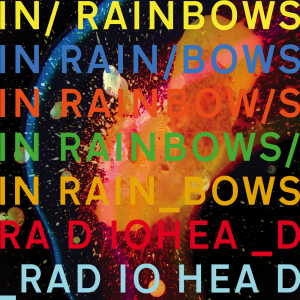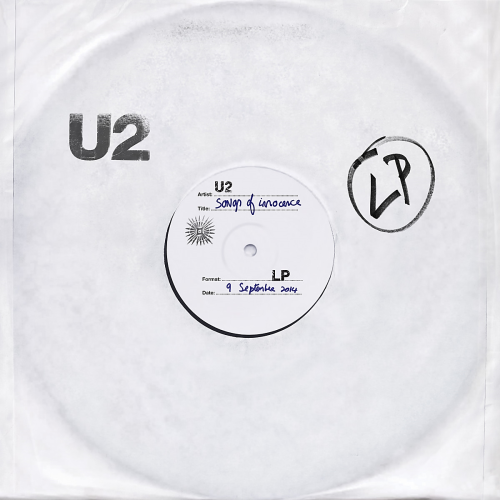U2 - The Unforgettable Fire
On Sunday 15th July 2007, readers of the UK’s Mail on Sunday found a little gift to go with their morning dose of casual xenophobia and Royal gossip. This gift was in the form of a CD - the new album by Prince, in fact, whose management had arranged the tie-in in lieu of a conventional album release. For many of the readers it was probably the first and last Prince entry in their collection. For others, it was probably the first and last Mail on Sunday…

Three months later, on 10th October, Radiohead released their new album In Rainbows as a digital download, allowing fans to pay whatever they wanted for it. With no minimum price specified, it was claimed that nearly two-thirds of people who downloaded the album opted to take their cue from the illegal download market and quietly grabbed it for free1. (No doubt some of them swore to pay later, or definitely buy the next one anyway). If you take into account the freeloaders, the average price paid was $2.26, which is probably about the cost of The Mail on Sunday at the time.
Not everyone was keen on the idea at the time. Many, including Nicky Wire of Manic Street Preachers, felt Radiohead and the “free music” model were demeaning music. U2’s manager Paul McGuiness was also sceptical:
Sixty to 70% of the people who downloaded the record stole it anyway, even though it was available for free.<a href=”https://news.bbc.co.uk/1/hi/entertainment/7445777.stm” title =”bbc”>Paul McGuiness</a>
The same methods would not work for U2, he said, who still relied heavily on sales of physical CDs. Intriguingly, though, he also said this:
We will obviously work with whatever technology is available to make the release of the new record as interesting as possible.
Speaking to the NME at the time, Bono, who probably doesn’t read The Mail on Sunday, felt Radiohead were -
courageous and imaginative in trying to figure out some new relationship with their audience… Such imagination and courage are in short supply right now.NME
Fast forward another five months, and The Charlatans made their new album You Cross My Path available as a free download from the web site of radio station XFM.
In the short term, everyone was a winner from these arrangements. Everyone involved in them was, anyway. The Mail on Sunday saw a huge spike in circulation, Prince profited handsomely from a sell-out 21-night residency at the O2 arena shortly afterwards, Radiohead sold more albums than in their recent past, and The Charlatans were able to re-announce themselves and climb back from the abyss of bands that had had it all (their debut album went straight in at #1) and seen it all gradually fade away.
Both Prince and Radiohead could afford to be generous with the upfront price, knowing that the money would be recouped anyway. Besides, Radiohead were kind of trying to make points about downloads, illegal downloads, the industry, and crumbs from the table. And if not points, then at least to stir up some debate. Also, it worked pretty well as a piece of PR for the album, which went on to sell over three million copies, making it a far greater success than its predecessor There There, and making a decent wedge for the band. Much of that wedge, it should be pointed out, was actually from sales in CD form when the album was given a conventional physical released, and what was called the “In Rainbows discbox” - which contained In Rainbows on CD and vinyl, with artwork, lyrics, and a second CD of additional tracks. The discbox version was available for £40 (about $80 at the time). Radiohead might have been revolutionaries with their “choose your own price” model, but perhaps we should also give them a gentle ticking off for happily shilling a luxury version.
On Tuesday, at a special show and tell session in Cupertino, California, Apple boss Steve Cook excitedly announced that U2’s new album **Songs of Innocence **would be given, absolutely free, to all iTunes customers. Sure enough, within hours, the album was sitting there in the account of 500 million users. Depending on who you ask, this is either brilliant - it’s free! What are you complaining about, grumpy old man of the first world? - or, frankly, a bit of an imposition if you don’t mind.
Whether you wanted it or not, if you have an iTunes account you now own U2’s new album. Depending on your iTunes settings, it is either in the cloud waiting for you, or already downloaded to your collection. It will forever be a record on your account, as a purchase, made by you. You can hide it, but you can’t delete it.

“We wanted to make a very personal album”, said Bono, with an entirely straight face.
The move will be pushed aggressively, have no doubt about it, as an example of the brilliant forward thinking of both camps. U2’s manager Guy Oseary (Paul McGuiness, the band’s manager for 35 years, stepped down in 2013) has praised Apple - “so collaborative and forward-thinking” - while Apple CEO Tim Cook has called this “the biggest album release in the history of music”, which brings to mind Bill Bailey’s reaction to hearing there was a world record for attaching the most pegs to your face - “that’s not a record - all you need to do to beat it is just have a bigger face!”.
Although it’s likely the free availability of Songs of Innocence will hurt physical sales of the album, U2 have an extensive back catalogue, which Universal has just slapped an enormous “SALE!” sticker on. And there WILL be a tour, you know. So that’s all good then.
Still, it will be interesting to see how many people actually download the album, taking willing ownership of it, although The Official Charts Company in the UK have already said that Songs of Innocence will not be eligible for the charts before the physical release, on the basis that people have to make an “active choice” to acquire music. If this stunt was chart-eligible it would be, to paraphrase Cook, the biggest chart hype in the history of music.
Also relevant is how many people listen to the album. I’m sure we’ve all gladly accepted a freebie CD but never actually find the time or a reason to crack open the protective covering and give it a spin. The last.fm weekly chart on Sunday might give some clue as to the true popularity of Songs of Innocence.
How I learned to stop worrying and tolerate U2
In the late 1990s and early 2000s I was only too happy to sound off about my views on U2. They were one of a handful of groups that had unwittingly offended me in some undefinable way, at some unremembered moment in the past.
There were always exceptions that proved the rule: Achtung Baby was the first CD I ever owned - a christmas present in 1991; Sunday Bloody Sunday and New Year’s Day were frequently played staples of the bar jukebox in my University hall of residence; Lemon was groovy.
In my own stubborn way I have always resisted The Joshua Tree. Oddly, Rattle and Hum was the first U2 album I warmed to. And then there’s the bizarre truth that I own a 7” of The Unforgettable Fire, which I must have bought at a record fair, possibly while malignly hypnotised, though I have no evidence to back this up. It makes sense in a way: The Unforgettable Fire is the first track on side two of cassette two on Now That’s What I Call Music 5, the first of only two compilations in the series that I own.
Given that the unique selling point of the Now series was the Virgin/EMI collaboration that made it the first to feature artists from more than one label, it’s a bit of a surprise to find that whereas the first in the series had included no fewer than 11 number one singles, Now 5 only featured one chart-topping hit.
And the name of that one lone best-seller? Frankie by Sister Sledge.
But perhaps one of the charms of Now 5 is the particular skill of series compiler Ashley Abrahams at Box records in creating a mix of the well-known and the comparatively obscure, On Now 5 you’ll find gooey ballads like Kool & The Gang’s Cherish, One More Night from Phil Collins, and Every Time You Go Away by Paul Young, but nestling among them you might just spot Gary Moore and Phil Lynott, Scritti Politti, Stephen Tintin Duffy and The Damned. Few among us still regularly give N-N-Nineteen Not Out by The Commentators (aka Rory Bremner) anything like a regular airing, but there’s always A View To A Kill, Slave to Love, or Black Man Ray to more than compensate.
And, of course, The Unforgettable Fire. Inspired by an art exhibition about Hiroshima that U2 had visited during the War tour, it beats all those Joshua Tree anthems into a cocked hat. Whereas on With or Without You the mystery and serenity is shattered by Bono’s vocal, here it provides just the right push, and while Where The Streets Have No Name and I Still Haven’t Found What I’m Looking For are constructed from industrial lead reinforced with super-gravity concrete, The Unforgettable Fire is slinky and swirly.
notes
- This claim was refuted by the band, but no official figures have been released to verify either side of the argument.